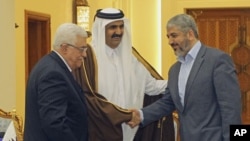Two rival Palestinian organizations, Hamas and Fatah, agreed on a power-sharing accord earlier this month. Analysts have different opinions on what effect - if any - the accord will have on the Middle East peace process.
The power-sharing agreement was brokered by the Emir of Qatar and signed in Doha by the leader of Fatah - Palestinian Authority President Mahmoud Abbas - and Khalid Meshal, leader of Hamas.
The accord calls for Abbas to lead an interim unity government that will prepare for new presidential and parliamentary elections this year.
Challenges ahead
Fawaz Gerges, Middle East expert with the London School of Economics, welcomes the accord. But he says many challenges lie ahead given what he calls the "deficit of trust" between the Fatah and Hamas leaderships.
“This particular rivalry has been going on for years," said Gerges. "Grievances have become deeply entrenched. Vested interests exist within Fatah and Hamas to maintain the status quo. Fatah is the ruling authority in the West Bank, and Hamas the governing body in Gaza. How do you dismantle deeply entrenched interests? How do you reconcile the ranks between the two movements? This is the first step in a million mile journey between the two rival movements.”
The U.S. State Department reacted cautiously to the unity accord, saying it is seeking more information. The United States and Israel consider Hamas a terrorist group.
'One or the other - not both'
For his part, Israeli Prime Minister Benjamin Netanyahu was clear when he said President Abbas can have either a pact with Hamas or peace with Israel. It’s one or the other, he said - not both.
Gerges says Netanyahu’s statement was expected. “It doesn’t matter what Hamas does. Netanyahu’s position is ideological - Hamas is evil, Hamas is the enemy of the peace process. Mahmoud Abbas can either have peace or have reconciliation with Hamas. Well the reason why Mahmoud Abbas, the leader of Fatah is trying to reconcile with Hamas, is because there is no peace,” he said.
The latest negotiations for a lasting peace between Israel and the Palestinians have been stalled for more than a year.
Key issues are the geographic outlines of a new Palestinian state, the status of Jerusalem, the return of Palestinian refugees and the construction of Jewish settlements in occupied territories.
Analysts say one major stumbling block to the peace process is the division in Palestinian leadership - the Palestinians are not speaking with one voice.
Effect
John Bolton, former U.S. ambassador to the United Nations, says this might happen now that there is a Fatah/Hamas unity government.
“Yes, but you also have Hamas not renouncing terrorism, not recognizing Israel’s right to exist, not signaling its agreement with all of the previous agreements between Israel and Palestinians - and that has always been a precondition to recognizing Hamas as a legitimate partner for peace,” he said.
Alon Ben-Meir, a Middle East expert with New York University, says the Fatah/Hamas accord is crucial for the peace process.
“It is impossible to make peace only with the Palestinian Authority on the West Bank and leave Hamas to its own devices. That isn’t going to work. So any peace agreement will require, by necessity, some kind of - not necessarily a unity agreement - but some kind of collaboration, cooperation between Hamas and Fatah,” he said.
But for Fawaz Gerges, the Fatah/Hamas power-sharing agreement represents a gift for Israeli Prime Minister Benjamin Netanyahu.
“Netanyahu will say look, Abbas has chosen an unholy alliance with Hamas and thus since Hamas, in his eyes, is the enemy of peace, I don’t have to make any changes, I don’t have to stop the building of settlements, I don’t even have to put any concessions on the table - the end of the story,” said Gerges.
Many experts say the United States must play a more active role in order to revive the Middle East peace process. But they also expect little progress in the months ahead because it is a presidential election year in the United States.
| Join the conversation on our social journalism site - Middle East Voices. Follow our Middle East reports on Twitter and discuss them on our Facebook page. |




